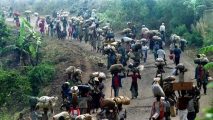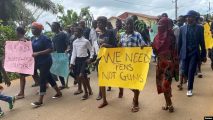Categories
Recent Posts
- Rwanda and DR Congo set May 2 deadline for peace deal
- Botswana president rebukes Biya, other African leaders clinging to power
- Man Utd strike agreement with Cameroon wonderkid
- Ambazonia Crisis: Pope Francis enduring call for peace, now a legacy
- Vatican: More than 20,000 gather as mourners file past Pope Francis’s open coffin
Archives
- April 2025
- March 2025
- February 2025
- January 2025
- December 2024
- November 2024
- October 2024
- September 2024
- August 2024
- July 2024
- June 2024
- May 2024
- April 2024
- March 2024
- February 2024
- January 2024
- December 2023
- November 2023
- October 2023
- September 2023
- August 2023
- July 2023
- June 2023
- May 2023
- April 2023
- March 2023
- February 2023
- January 2023
- December 2022
- November 2022
- October 2022
- September 2022
- August 2022
- July 2022
- June 2022
- May 2022
- April 2022
- March 2022
- February 2022
- January 2022
- December 2021
- November 2021
- October 2021
- September 2021
- August 2021
- July 2021
- June 2021
- May 2021
- April 2021
- March 2021
- February 2021
- January 2021
- December 2020
- November 2020
- October 2020
- September 2020
- August 2020
- July 2020
- June 2020
- May 2020
- April 2020
- March 2020
- February 2020
- January 2020
- December 2019
- November 2019
- October 2019
- September 2019
- August 2019
- July 2019
- June 2019
- May 2019
- April 2019
- March 2019
- February 2019
- January 2019
- December 2018
- November 2018
- October 2018
- September 2018
- August 2018
- July 2018
- June 2018
- May 2018
- April 2018
- March 2018
- February 2018
- January 2018
- December 2017
- November 2017
- October 2017
- September 2017
- August 2017
- July 2017
- June 2017
- May 2017
- April 2017
- March 2017
- February 2017
- January 2017
- December 2016
- November 2016
- October 2016
- September 2016
- August 2016
- July 2016
- June 2016
Featured
 Burkina Faso: Where vision meets discipline
Burkina Faso: Where vision meets discipline  Prosecution of journalists in Cameroon: European Parliament says enough red flags have been ignored
Prosecution of journalists in Cameroon: European Parliament says enough red flags have been ignored  1982-2025: How long will Biya hang on?
1982-2025: How long will Biya hang on?  How Biya and Archbishop Nkea protected the sanctity of the family in Cameroon
How Biya and Archbishop Nkea protected the sanctity of the family in Cameroon  October Presidential Election: Will 92-year-old Biya be re-elected?
October Presidential Election: Will 92-year-old Biya be re-elected?
Most Commented Posts
 4 Anglophone detainees killed in Yaounde
4 Anglophone detainees killed in Yaounde
18 comments Chantal Biya says she will return to Cameroon if General Ivo Yenwo, Martin Belinga Eboutou and Ferdinand Ngoh Ngoh are sacked
Chantal Biya says she will return to Cameroon if General Ivo Yenwo, Martin Belinga Eboutou and Ferdinand Ngoh Ngoh are sacked
13 comments The Anglophone Problem – When Facts don’t Lie
The Anglophone Problem – When Facts don’t Lie
12 comments Anglophone Nationalism: Barrister Eyambe says “hidden plans are at work”
Anglophone Nationalism: Barrister Eyambe says “hidden plans are at work”
12 comments Largest wave of arrest by BIR in Bamenda
Largest wave of arrest by BIR in Bamenda
10 comments
Latest Tweets
Featured
-

Rwanda and DR Congo set May 2 deadline for peace deal
-

Botswana president rebukes Biya, other African leaders clinging to power
-

Man Utd strike agreement with Cameroon wonderkid
-

Ambazonia Crisis: Pope Francis enduring call for peace, now a legacy
-

Vatican: More than 20,000 gather as mourners file past Pope Francis’s open coffin
-

Hajj 2025: Atanga Nji visits Ethiopian Airlines
-

Teachers strike shuts down schools across Cameroon
© Cameroon Concord News 2025
8, October 2017
Abuja to try 2,300 Boko Haram militants 0
Nigeria is going to try more than 2,300 suspected members of the Takfiri Boko Haram militant group in unprecedented mass trials behind closed doors.
The defendants, whose trials are to begin on Monday, have all been picked up and held in detention since the start of Boko Haram militancy eight years ago.
To date, just 13 people have been put on trial and only nine convicted for their links to the Takfiri group, according to official figures.
The most high-profile current case is that of Khalid Al-Barnawi, a leader of Boko Haram offshoot Ansaru, who is charged with the abduction and murder of 10 foreign nationals.
Nigeria’s Justice Ministry announced the start of the trials at the end of last month, saying four judges had been assigned and that defendants would have legal representation.
Some 1,670 detainees at a military base in Kainji, in the central state of Niger, will be tried first and will be followed by 651 others held at the Giwa barracks in the capital of the northeastern state of Borno State, Maiduguri.
The trials are seen as a positive step, as many of the detainees had been held in custody for years, without access to a lawyer or ever having appeared before a judge. Amnesty International said in a June 2015 report that more than 20,000 people had been arbitrarily arrested as part of the fight against Boko Haram.
President Muhammadu Buhari, who was elected in 2015, has promised to look into repeated accusations of human rights violations, including by high-ranking officers.
At least two commissions of inquiry have been established but the army announced in June this year that no action would be taken against top brass accused by Amnesty.
Amnesty believes the mass trials of Boko Haram suspects were the result of international pressure on the Nigerian government.
Source: Presstv